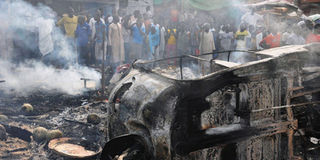Nigeria police warn of planned suicide attacks on capital city

PHOTO | AFP People gather to look at a burnt vehicle following a bomb explosion that rocked the busiest roundabout near the crowded Monday Market in Maiduguri, Borno State, on July 1, 2014. Police have warned of a new wave of suicide attacks by Boko Haram Islamists in the capital Abuja.
What you need to know:
- Boko Haram insurgents planning mass murder
- A car bomb at the same spot two weeks later killed 19 and left 80 others injured, while 21 people were killed on June 25 at a crowded Abuja shopping centre in other attacks blamed on the sect.
ABUJA, Saturday
Nigerian police warned on Saturday of a new wave of terrorist attacks on the capital Abuja, where more than 100 people have been killed in bombings since April.
Officers claimed they had “credible intelligence reports” of suicide attacks being planned on the city’s transport system, with terrorists also plotting to detonate improvised explosive devices concealed in luggage, bags and cans.
The Islamist Boko Haram sect claimed responsibility for killing 75 people in the bombing of the main bus station at Nyanya, on the outskirts of Abuja, on April 14.
A car bomb at the same spot two weeks later killed 19 and left 80 others injured, while 21 people were killed on June 25 at a crowded Abuja shopping centre in other attacks blamed on the sect.
INTERNATIONAL PRESSURE
“The terrorists have perfected a plot to carry out attacks on the Abuja transport sector,” the police said in a statement on Saturday.
It urged people to be vigilant, and said that security forces were working to “deal with the threat”.
The Nigerian government has been under intense international pressure since the abduction of 276 girls by Boko Haram from a secondary school in Chibok in the north of the country in April.
Parents and local leaders have accused the military of doing almost nothing to secure the release of the hostages.
Fifty-seven of the girls escaped within days of the night-time raid on the school in Borno state but local officials have said that 219 are still being held.
In a related development, Nigerian troops operating in the northeast part of the country have captured a massive armoury with arms and ammunition belonging to the Boko Haram insurgents, Nigerian Defence Headquarters has said.
Maj-Gen Chris Olukolade, spokesperson of the Nigerian military headquarters, said in a statement that 80 machine guns and 10 rifles were found in Darazo forest in Bauchi State following continuing mop-up operations.
“Troops have so far recovered over 10 rifles as well as more than 80 machine guns, rocket propelled grenades and launchers, cables, wires and thousands of rounds of ammunition,” Olukolade added.
He said suspects captured in the forest had been taken into custody and are volunteering information.
Boko Haram has recently increased its activities in Borno, a state in the northeastern region of Nigeria, which shares a border with Cameroon, Niger and Chad.
The group, a security threat since 2009, has killed hundreds of people in the last three months in the northeast region.
Meanwhile, at least 160 people have been killed in recent attacks in Sanga area of central north Nigeria’s Kaduna state by yet-to-be identified gunmen, local official said.
The attacks carried out simultaneously in two villages in Sanga council area lasted three days, prompting the local government to impose a 24-hour curfew as the crisis situation escalated.
Council chairman Emmanuel Adamu, briefing the state Deputy Governor Nuhu Bajoga, who was on tour of the area on Friday, said more than seven villages and not two as earlier reported were actually attacked by the gunmen.
He said over 160 residents were killed while over 24,000 people were displaced following the attacks.
The deputy governor called on those who fled the area to return to their communities as government had put in place measures to ensure their safety.
Bajoga assured people that adequate security would be put in place to forestall future attacks.
Kaduna is one of the states bearing the brunt of attacks in Nigeria, with women and children worst affected.
Nigeria is currently grappling with various security challenges, part of which is the insurgency of Boko Haram, a group which seeks to enshrine the Islamic sharia law in the constitution of the West African country.






